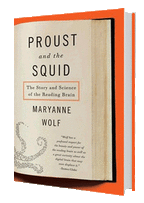
A funny thing happened over time: I began to benefit from the very process of writing. I found that as I reflected on my craft and as I formed the messages I hoped to convey, they became more concretized in my mind. In a way, the writing process for me became dialectic. Maryanne Wolf writes in her excellent book “Proust and the squid: the story and science of the reading brain that “the writer’s efforts to capture ideas with ever more precise written words contain within them an inner dialogue, which each of us who has struggled to articulate our thoughts knows from the experience of our watching our ideas change shape through the sheer effort of writing” (p.73).
I don’t know whether or not you like to write, but I have found it to be tremendously helpful in the weaving together of prior-to disconnected thoughts. Much like how a good conversation with a colleague or friend can lead to new and deeper understandings, so too the process of wrestling with the right words can lead to novel insights. Two warnings, however: it’s not easy, and it takes time. The process for me often means that I’ve read a few interesting books, I’ve saved a few quotes, and then I’ve ruminated on the ideas for a time. When it comes time to put the words on the page, I begin writing, deleting, copy-paste-moving, and eventually arrive at a piece that feels right. This piece, for example, started on October 28, 2013!
As important as communicating ideas to our communities is, the process of writing itself can be an individually formative process. We often think of the weekly newsletter article as another item on the to-do list. However, if we regard writing as a practice that develops us as thinkers and leaders we may find renewed interest in writing well.
Wolf, M. (2007). Proust and the squid: the story and science of the reading brain. New York, NY: HarperCollins.

 RSS Feed
RSS Feed
